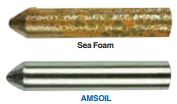Signature Series cleans up the competition In general, the higher an oil’s TBN, the better its ability to neutralize contaminants such as combustion by-products and acidic materials. Higher TBN oils neutralize a greater amount of acidic material, which results in longer oil life and cleaner engines. TBN levels decrease as the oil remains in service. […]
You are browsing archives for
Tag: cleaning
Small engine won’t start? Identifying th
Small engine won’t start? Bad gas is the number-one reason, and here’s how to prevent it. Len Groom | TECHNICAL PRODUCT MANAGER, POWERSPORTS In northern Minnesota, where I live, the temperature occasionally breaks 80ºF (27ºC) in the summer. When it does, it’s time to fire up my Jet-Skis* and hit the lake. The last thing […]

